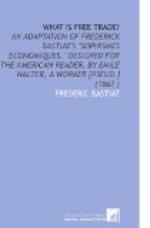Here, as elsewhere, we find the theorists who favor protection taking part with the producer. Let us consider the case of the unfortunate consumer, who seems to have entirely escaped their attention. They compare the field of protection to the turf. But on the turf, the race is at once a means and an end. The public has no interest in the struggle, independent of the struggle itself. When your horses are started in the course with the single object of determining which is the best runner, nothing is more natural than that their burdens should be equalized. But if your object were to send an important and critical piece of intelligence, could you without incongruity place obstacles to the speed of that one whose fleetness would secure you the best means of attaining your end? And yet this is your course in relation to industry. You forget the end aimed at, which is the well-being of the community; you set it aside; more, you sacrifice it by a perfect petitio principii.
But we cannot lead our opponents to look at things from our point of view; let us now take theirs: let us examine the question as producers.
I will seek to prove:
1. That equalizing the facilities of production is to attack the foundations of mutual exchange.
2. That it is not true that the labor of one country can be crushed by the competition of more favored climates.
3. That, even were this the case, protective duties cannot equalize the facilities of production.
4. That freedom of trade equalizes these conditions as much as possible; and
5. That the countries which are the least favored by nature are those which profit most by mutual exchange.
1. Equalizing the facilities of production is to attack the foundations of mutual exchange. The equalizing of the facilities of production, is not only the shackling of certain articles of commerce, but it is the attacking of the system of mutual exchange in its very foundation principle. For this system is based precisely upon the very diversities, or, if the expression be preferred, upon the inequalities of fertility, climate, temperature, capabilities, which the protectionists seek to render null. If New England sends its manufactures to the West, and the West sends corn to New England, it is because these two sections are, from different circumstances, induced to turn their attention to the production of different articles. Is there any other rule for international exchanges?
Again, to bring against such exchanges the very inequalities of condition which excite and explain them, is to attack them in their very cause of being. The protective system, closely followed up, would bring men to live like snails, in a state of complete isolation. In short, there is not one of its sophisms, which, if carried through by vigorous deductions, would not end in destruction and annihilation.




